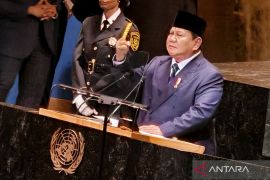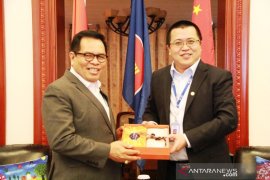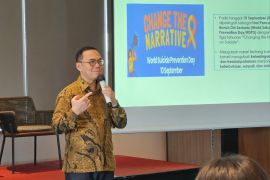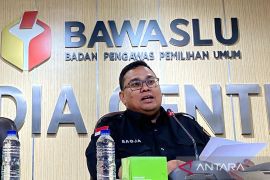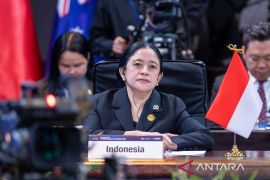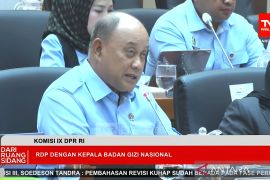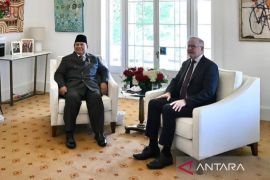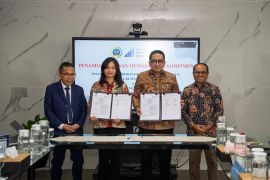Indonesia now had 130 overseas diplomatic missions. Of the number 118 were old ones, 11 new and one was about to be opened, namely in Baghdad,Iraq.Jakarta (ANTARA News) - President Susilo Bambang Yudhoyono earlier this month was busy giving directives to Indonesian ambassadors and explaining the country`s economic and political developments to foreign envoys posted in Jakarta.
First, he talked to 76 foreign ambassadors, 19 charges d`affaires and 21 heads of international organization at the foreign ministry`s Pancasila Building, on February 15, 2012, emphasizing the nation`s commitment to democracy.
A week later, on February 23, 2012, the head of state expressed his hopes about what the nation must achieve in international diplomacy to 130 Indonesian ambassadors, consul generals, consuls and charge d`affaires ad interim in the foreign affairs ministry`s working meeting also held in the Pancasila Building.
And on February 27, Yudhoyono held a meeting at Bogor Palace, West Java, only with 14 Indonesian ambassadors to countries considered as strategic partners, namely China, India, Japan, the United States, Turkey, Brazil, France, South Korea, the European Union, Russia, Australia, South Africa, Vietnam, and Britain.
Speaking to over 130 Indonesian diplomats, President Yudhoyono asked them to step up economic diplomacy and to orient themselves to results because their performance would be judged based on what they had achieved.
"If there is a treaty, agreement or MoU, the diplomat`s duty is to implement them. Efforts resulting in the signing of an MoU, agreement or treaty, are an achievement but a higher achievement lies in their implementation," the President said, adding that they must "always be ready, active and creative."
Throughout 2011, Indonesia signed 146 international agreements, 131 of which were bilateral, and ratified 26 others. Nearly 90 percent of the agreements were bilateral , and more than 60 percent were in the economic sector, according to the foreign affairs ministry data.
The head of state said Indonesian diplomats needed to have a thorough understanding of their missions and tasks and to be always creative by evolving new ideas as well as have a sound knowledge about economic matters.
"We must step up our economic diplomacy. I want all Indonesian ambassadors to be knowledgeable about and understand economic matters," the President said, adding that one of the ways to maintain economic growth was promoting investment and exports.
In order to help him monitor the performance of Indonesia`s ambassadors in foreign countries, he asked them to submit their annual reports on their work to him directly.
"Five pages to me are enough with copies to the vice president, the foreign minister and the head of the Ministerial Work Performance Monitoring Unit (UKP4). Write your reports factually, what you have achieved which we will later, of course, verify," the president said.
And in a separate meeting with 14 Indonesian ambassadors to strategic partner countries, he particularly asked them to work hard in order to obtain maximum results from the comprehensive and strategic partnerships with the foreign countries.
The 14 envoys were Dino Patti Djalal (Indonesian ambassador to the United States of America), Jauhari Oratmangun (to Russia), Sudaryomo Hartosudarmo (Brazil), Nahari Agustini (Turkey), Rezlan Djenie (France), Arif Havaz Oegroseno (European Union), Imron Cotan (China), Nicholas Tandi Dammen (South Korea), Andi Muhammad Ghalib (India), M Lutfi (Japan), Primo Alui Julianto (Australia), Sjahril Sabaruddin (South Africa), Mayerfas (Vietnam), and Moh Hamzah Tayeb (Britain).
During the meeting at the Bogor Palace, each ambassador presented reports on the progress of cooperation between Indonesia and the countries where they were posted.
The president urged the ambassadors assigned to countries belonging to the G20 group, emerging economies and advanced states, to become the nation`s spearhead in striving to promote the nation`s interests.
In fact, the country`s foreign policy undertaken in 2011 was always anchored in the national interest, and inspired by the principles of partnership and equality.
"In line with the principle of an independent and active foreign policy, Indonesia has always taken an independent posture in foreign affairs, both in its perspectives and actions. All efforts were undertaken to secure Indonesia`s national interests," Minister Marty said in his annual speech in early 2012.
He said the national interests as enshrined in the Preamble of the 1945 Constitution were: to protect all the people and the country of Indonesia; to improve public welfare; to educate the people; and to help create a world order that is based on freedom, lasting peace, and social justice.
According to Marty, economic diplomacy was integral to Indonesia`s bilateral diplomacy and Indonesia`s representative offices abroad served as the backbone of the nation`s economic diplomacy.
Efforts to enhance economic, trade and investment relations with other countries were one of the priorities of Indonesian diplomacy, in order to support national development and economic growth and to enhance the people`s welfare.
A wide range of economic diplomacy efforts had been conducted by Indonesia`s Representative Offices in every corner of the world, from Azerbaijan to Zimbabwe; from New Zealand to China.
According to Marty, the nation had witnessed and harvested the outcomes. Throughout 2011, for instance, Indonesia`s bilateral trade volumes with almost all countries increased compared to those in the year 2010.
For example, the trade volumes with 13 countries with which Indonesia had a strategic partnership had enjoyed sharp increases, above 50 percent on average.
With Turkey, for instance, Indonesia had set a target of bilateral trade value at around five billion US dollars by 2014, and further up to 10 billion US dollars in the future.
Indonesian Ambassador to Turkey Nahari Agustini last year said the bilateral trade value between Indonesia and Turkey increased to 1.7 billion US dollars in 2010, up from 1.2 billion US dollars in 2009. Of the total 1.7 billion US dollars, 1.4 billion US dollars were in favor of Indonesia, she said.
The two-way goods trade between Indonesia and the United States, for example, grew to $23.4 billion in 2010, and in the first half of 2011 US exports to Indonesia expanded by 17 percent year-on-year while the US`s imports from Indonesia grew by 22 percent.
Indonesia now had 130 overseas diplomatic missions. Of the number 118 were old ones, 11 new and one was about to be opened, namely in Baghdad,Iraq.
As for Palestine, Indonesia was planning to appoint an honorary consul who would be based in Ramallah.
Indonesian ambassador to the US Dino Patti Djalal told the media that he had met Palestine President Mahmoud Abbas in Amman, Jordan, on Tuesday (Feb 28) to convey President Susilo Bambang Yudhoyono`s letter to the Palestinian people.
According to Dino, the letter contained several points, including Indonesia`s plan to appoint an honorary consul to Palestine, the Jakarta Post reported.
The existence of 130 overseas missions including one at the United Nations headquarters was a measure of the wide scope and reach of Indonesia`s foreign policy, Minister Marty said.(*)
Reporter: By Fardah
Editor: Heru Purwanto
Copyright © ANTARA 2012
